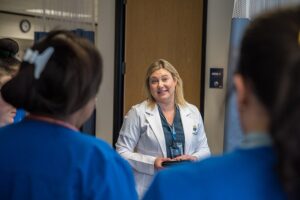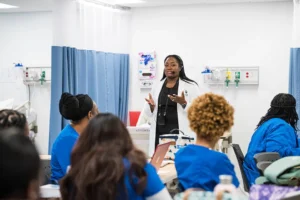Are you passionate about restoring justice and empowering abuse survivors? Do you find yourself constantly asking questions and feeling naturally inquisitive? Are you detail-oriented and excel in critical thinking? Do you want to use these skills in healthcare? If you said yes, then a career in forensic nursing may be the perfect fit for you!
Forensic nursing is a unique career that blends the science of healthcare with the investigation of law enforcement. Careful nursing assessment and documentation provide evidence used in crime cases, supporting the legal system. Forensic nurses serve as patient advocates for those who’ve experienced violence and trauma, offer support and resources, and help contribute to safer communities. In this article, we’ll cover everything you need to know about how to become a forensic nurse, from what they are, to what nursing education you’ll need to become one.
What is a Forensic Nurse?
A forensic nurse is a registered nurse who provides specialized nursing care to patients that have experienced violence, such as assault or abuse. These nurses often work with deceased patients, gathering evidence for legal purposes. They frequently work alongside medical examiners, law enforcement, pathologists, and coroners.
What do forensic nurses do?
These nursing professionals gather evidence through thorough assessments and provide detailed, accurate documentation that can be used in resolving crimes and seeking justice. Additionally, they offer emotional and psychological support to patients and their families by providing trauma-informed care.
Where do forensic nurses work?
As you think about how to become a forensic nurse, you probably wonder where you could potentially work. Common workplaces for forensic nurses include hospitals, coroner’s offices, prisons, psychiatric hospitals, CSI, FBI, and rape crisis centers.
Choose a Nursing Education Path
Your very first step in your journey to becoming a forensic nurse is to enroll in nursing school. There are different routes to become a registered nurse (RN), but they mostly boil down to two options: Associate Degree in Nursing (ADN) or Bachelor of Science in Nursing (BSN).

The ADN program takes about two years to complete and prepares students to become entry-level nurses. Although it covers basic nursing skills and fundamental nursing education, it is less intensive than the BSN program. While you do have a chance to enter the field sooner with the ADN, you limit your ability to advance in your nursing career. For example, if you wanted to become a nurse practitioner (NP) one day, you’d first have to obtain a BSN before starting the NP-related education.
Find an Accredited Nursing Program
It’s very important to ensure that the nursing school you choose is programmatically accredited. As part of nursing accreditation, an independent authority reviews the program to ensure it meets the necessary education requirements for nursing students. If you don’t choose an accredited program, you may not be eligible to apply for RN licensure in your state or sit for the NCLEX-RN exam.
Finding an accredited nursing program is relatively simple, as most nursing programs will proudly display their accreditation. But if you don’t see accreditation listed as part of the nursing program, you’ll want to verify with their admissions team that they are in fact accredited. The most common accreditations are the Commission on Collegiate Nursing Education (CCNE), the Accreditation Commission for Education in Nursing (ACEN), and the Commission for Nursing Education Accreditation (NLN CNEA). ACEN-accredited schools are required to display this status publicly, while CCNE-accredited schools may choose not to display it. The links above will take you to directories where you can search for accredited nursing schools.
In addition to checking for accreditation, you’ll also want to ensure your nursing program is approved by the board of nursing in the state in which you want to work as an RN. This can be done by searching the database on the state board of nursing’s website.
Learn Nursing Skills & Theory
A nursing education will equip students with the theory (knowledge) and skills (practice) of nursing. Some of the core classes in nursing programs include fundamentals of nursing, anatomy and physiology, pharmacology, and pathophysiology. One core component in these classes is clinical judgment. This concept is one of the most important parts of nursing because it’s how nurses analyze patient health and make their treatment decisions.
Clinical judgment involves synthesizing information gathered from physical assessment, patient histories, laboratory findings, and diagnostic tests to make clinical decisions and ask important questions. This skill is essential for forensic nurses who are essentially the Sherlock Holmes in healthcare.
Other nursing courses are beneficial to building a solid foundation of nursing skills and knowledge. These nursing courses will provide valuable education for your future forensic nursing career:
- Anatomy and Physiology: This class teaches nursing students about bodily functions, relationships between body systems and organs, and how diseases can alter these systems. This knowledge is fundamental for forensic nurses who must use critical thinking to analyze medical evidence.
- Physical Assessment: This class teaches nursing students how to perform comprehensive physical assessments, obtain health histories, and identify signs of health problems. As a forensic nurse, your assessment skills will be one of your most relied upon abilities.
- Ethics in Healthcare: This class teaches nursing students about ethical decision making in healthcare, patient rights and autonomy, and how to navigate ethical dilemmas. Forensic nurses often care for patients who’ve had their rights violated, making this course crucial for these nurses to provide professional and compassionate trauma-informed care.
- Nursing Communications: This class teaches nursing students effective communication and collaboration skills. This is one of the most important nursing classes for forensic nurses, as they will be collaborating with a multidisciplinary team and working with highly sensitive information.
- Mental Health Nursing: This class teaches nursing students about mental health conditions and their treatment, as well as communication skills for caring for this population. Forensic nurses are often employed in psychiatric facilities, so this class equips them with essential knowledge and interpersonal skills.
Gain Real-World Experience in Clinicals
All nursing students must gain real-world experience through clinicals, also called clinical rotations. Clinicals are the portion of nursing education that accompanies the in-class component and is where students get to apply their knowledge. Nursing students get to shadow and assist current RNs working in real-world healthcare environments.

Certain nursing classes will have their own clinical rotation. For example, when learning about pediatric nursing, students will have a set amount of practice hours within clinical rotations in pediatric settings, like a pediatric hospital or doctor’s office. Nursing students are graded on their performance and skills in their clinical rotations and have a set of core competencies they must pass.
As you prepare to become a forensic nurse, pay extra attention to these nursing clinical sites:
- Emergency Room
- Psychiatric unit
- Behavioral health center
- Medical-surgical unit
- Pediatric hospital
- Public health department
Graduate from a BSN or ADN Nursing Program
Earning your nursing degree is a vital step on your journey to becoming a forensic nurse. Whether you chose an ADN or BSN program, graduating is one of the major milestones to becoming a registered nurse. A nursing degree is not just about a title – it’s about the years you’ve spent studying, and practicing nursing in a variety of clinical settings, that will qualify you to become a registered nurse.
Apply for RN Licensure, Pass the NCLEX-RN Exam
Now that you’ve completed your nursing education, the next step is to apply for RN licensure. This is handled through the Board of Nursing for the state in which you want to work as a nurse. When you apply for RN licensure, the Board of Nursing will conduct a background check. Pending background check results, you’ll receive a date and time to take the NCLEX-RN exam.
The NCLEX-RN exam is the test each nursing student must pass before officially becoming an RN. This is the test that qualifies you to practice legally, and safely, in the United States.
Once you’ve passed, you can begin working as an RN! In the first few years of your career, it’s recommended to start gaining clinical experience in a general specialty, such as medical-surgical nursing in the hospital. Taking this step allows you to learn a broad range of nursing skills you will need for your future forensic nursing career. You might also consider working in the intensive care unit (ICU), emergency room (ER), critical care unit (CCU), progressive care unit (PCU), behavioral health center, or trauma center.
Apply for Forensic Nursing Jobs
After you have a few years of nursing experience under your belt, you’re ready to begin searching for and applying for forensic nursing jobs. Networking is a great way to start this process – you’ll not only hear about jobs, but you’ll build valuable connections as well. Try talking to your nursing manager, the emergency room director, the flight nurses, and fellow ER nurses. Also, consider introducing yourself to nurses that are currently practicing as forensic nurses and find out how they got started.
One question you may have as you contemplate becoming a forensic nurse is how to actually find the jobs. Like with other nursing jobs, you’ll utilize specialized job boards. Try checking for job openings in these places:
- Law enforcement offices
- Forensic science centers
- Corrections institutions
- Crisis centers
When you’re ready to apply for forensic nursing jobs, you’ll need solid nursing experience, stellar communication skills, critical thinking skills, and a strong nursing resume. Make sure you emphasize your communication skills, attention to detail, and interpersonal skills on your resume, as these are important skills in forensic nursing.
Obtain a Forensic Nursing Certification
Although it’s not always mandatory to become certified in forensic nursing to become a forensic nurse, it can help you as you apply for forensic nursing jobs. Nursing certifications set you apart from your nursing peers, showing that you have a higher than standard education and expertise in that nursing specialty.
The International Association of Forensic Nurses (IAFN) offers two forensic nursing certifications – one for adult nursing and one for pediatric nursing. To be eligible to obtain these certifications, you’ll need at least two years of RN experience, 40 hours of Sexual Assault Nurse Examiner (SANE) classroom training, and 40 hours of SANE clinical training. If you meet all of the eligibility criteria, you can apply to take the proctored exam.
Start Your Future in Nursing Today

Why Choose Arizona College of Nursing?
- Earn a BSN degree in 3 years or less with eligible transfer credits
- Campus locations throughout the US
- Night classes for general education courses
- Hybrid Online/In-Person format for general education classes
- Nursing education is all we do
- CCNE-Accredited Program*
- NCLEX-RN success coaches and exam preparation class
- Financial aid available to those who qualify
Discover Your Path to a Career in Nursing
Information in this post is accurate as of .
*The Bachelor of Science in Nursing (BSN) degree program at Arizona College of Nursing is accredited by the Commission on Collegiate Nursing Education (https://www.aacnnursing.org/). All Arizona College of Nursing and Arizona College campuses are institutionally accredited by the Accrediting Bureau of Health Education Schools (https://www.abhes.org/), a U.S. Department of Education-recognized national accrediting agency.

